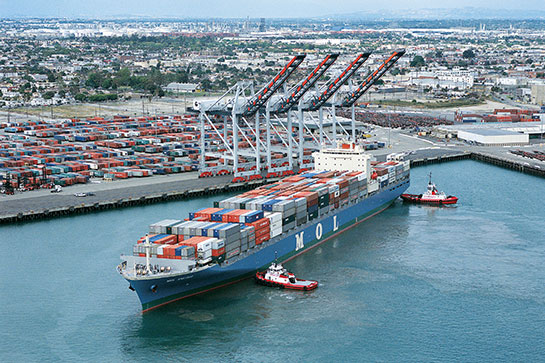The American Meat Institute (AMI) has joined with the National Chicken Council, the International Warehouse and Logistics Association and more than 100 other trade groups calling for settlement of the ongoing US West Coast port labor dispute. They have sent a joint letter to leaders of the International Longshore and Warehouse Union (ILWU) and Pacific Maritime Association (PMA) urging the two sides to reach an agreement as soon as possible as the ongoing impasse has led to bottlenecks and significant delays at major ports.
According to a report published in the Los Angeles Times on October 27, the twin ports of Los Angeles and Long Beach, which combined handle more than twice as much container traffic as any other US port, “are experiencing a logistical nightmare.” Calling the situation “the worst shipping crisis in a decade,” the newspaper noted that “mammoth vessels loaded with products destined for the nation’s stores are sitting idle just off the coast, waiting for cargo languishing on the docks to clear.”
 Container imports rose 11% last month at the Port of Los Angeles, at a time when a major labor dispute between the ILWU and PMA have led to delays in cargo clearance there and at other West Coast ports in the US and Canada.
Container imports rose 11% last month at the Port of Los Angeles, at a time when a major labor dispute between the ILWU and PMA have led to delays in cargo clearance there and at other West Coast ports in the US and Canada.
West Coast ports are the main gateway for much of the frozen seafood exports to the United States, most of which comes from Asia. They are also the exit points for a great deal of frozen meat and other foodstuffs bound for East Asian markets.
“The financial and economic situation for thousands of importers and exporters who rely on the West Coast ports, and their millions of employees and business partners, rest on the timely conclusion of a new port labor contract,” emphasized the letter dispatched by the AMI and other trade associations.
It continued: “The congestion problems at key West Coast ports in both the US and Canada are getting worse each day, and the absence of a new signed contract between the ILWU and PMA is a significant contributing factor. Many of the stakeholders that we represent are already experiencing significant adverse effects of delays in moving their cargo…This will soon start to have a negative impact on the overall economy. We ask that both parties recognize that time is of the essence. We encourage you to stay the course, complete the contract negotiations as soon as possible and work to resolve the current congestion issues without further interrupting the flow of commerce.”
Meanwhile, cargo container traffic reportedly rose 7.3% in September at the Port of Long Beach compared to the same month last year, making for the Southern California seaport’s busiest September since 2007, which was its peak year.
A total of 629,771 TEUs (twenty-foot equivalent units) were moved through the Long Beach harbor in September. Of those, 339,343 TEUs were imports, up 10.2% compared to September of 2013. Exports declined 12.1% to 118,412 TEUs. Empty container moves increased 19.1% to 172,016 TEUs. Empties are typically repositioned overseas to be refilled with goods.
Cargo numbers climbed in September largely due to the importation of products for the upcoming holiday shopping season. The jump in imports made this September the third-busiest import month in Long Beach’s history. For the year to date, Port of Long Beach containerized cargo is up 1.7%.
Containerized cargo throughput was also brisk at the Port of Los Angeles, which saw overall volumes increase by 9% this September compared to the same month in 2013. Total cargo for September 2014 was 775,133 TEUs, making it the busiest single month since August 2006. The increased traffic reflects peak season volumes and larger vessels calling at the port.
Container imports increased 11%, from 370,786 TEUs in September 2013 to 411,507 TEUs in September 2014. Exports rose 0.20 percent, from 150,380 TEUs in September 2013 to 150,679 TEUs in September 2014.
Combined, total loaded imports and exports increased 7.9%, from 521,166 TEUs in September 2013 to 562,185 TEUs in September 2014. Factoring in empties, which increased 12.2% year over year, overall September 2014 volumes (775,133 TEUs) rose 9% compared to September 2013 (710,892 TEUs).
For the first nine months of calendar year 2014, overall volumes (6,302,470 TEUs) have increased 7.8% at the Port of Los Angeles compared to the same period in 2013 (5,847,167 TEUs).





